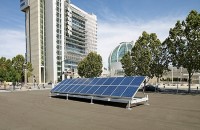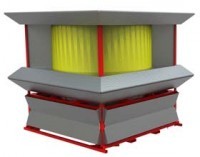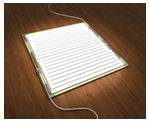 You gotta be crazy to start a green-tech company these days, right? Venture funding has fallen off the proverbial cliff since the economy imploded last September, and even established renewable energy companies are struggling to stay afloat until the Obama stimulus cash begins to flow.
You gotta be crazy to start a green-tech company these days, right? Venture funding has fallen off the proverbial cliff since the economy imploded last September, and even established renewable energy companies are struggling to stay afloat until the Obama stimulus cash begins to flow.
But it seemed more 1999 than 2009 this week at Microsoft’s Silicon Valley headquarters when a crowd of entrepreneurs showed up to elevator-pitch their startups to a panel of VCs and win $40,000 in services. Competition to just get in the door was fierce, with 400 companies vying for 30 slots at Launch: Silicon Valley, the annual competition put on by the Silicon Valley Association of Startup Entrepreneurs. It was standing room only, with a few of the baby-faced CEOs and their middle-aged competitors flying in from as far away as Brooklyn and Beijing for the chance for some VC face time.
Given that a sixth of the competitors were classified as clean-tech startups, I naturally wanted to see what sort of companies are on the launch pad in the midst of the Great Recession — and what that may augur for the future.
The short answer: Plug-and-play.
 A SunPod solar array.Take SunPods, a San Jose startup making self-contained solar-panel arrays. Cofounder Michael Gumm says the SunPods are transported directly from the factory and can begin generating electricity after a 10-minute installation that only requires the services of an electrician.
A SunPod solar array.Take SunPods, a San Jose startup making self-contained solar-panel arrays. Cofounder Michael Gumm says the SunPods are transported directly from the factory and can begin generating electricity after a 10-minute installation that only requires the services of an electrician.
Conventional rooftop or ground-mounted solar arrays and their electrical components need to be assembled on-site. But wheels can be attached to SunPods’ 20-foot-long arrays to create a mobile power plant that can be moved to where it’s needed, according to Gumm.
“Think of SunPods as a solar power appliance,” he said. “Today, Wal-Mart called us up. They’re interested in putting our systems in their parking lots.”
Other potential customers include farmers who want to power irrigation pumps with solar arrays, and the military — Gumm says he’s met with the Marines — which presumably would want to roll a solar array onto the battlefield. SunPods could also be deployed as solar power plants for utilities or commercial customers.
Gumm said the company, which has so far raised $499,999 in funding, will begin shipping SunPods to the San Francisco Bay Area this month and Southern California in the fall before targeting other states in 2010. (Imagine the solar potential of all those “black fields” — the acres of empty parking lots surrounding recession-shuttered big-box stores and shopping malls.)
 A Windation turbine.Another Silicon Valley company, Windation Energy Systems, pitched its rooftop 5-kilowatt wind turbine as a renewable energy device that could be installed on a commercial building like an air conditioner. “It’s a plug-and-play system,” CEO Mark Sheikhrezai told the VCs.
A Windation turbine.Another Silicon Valley company, Windation Energy Systems, pitched its rooftop 5-kilowatt wind turbine as a renewable energy device that could be installed on a commercial building like an air conditioner. “It’s a plug-and-play system,” CEO Mark Sheikhrezai told the VCs.
The rather homely $25,000 machine (tack on another $10,000 for installation) will never be called the iPod of wind turbines, but Sheikhrezai claims it can generate 62 watts per square foot of roof space compared to 10 to 12 watts for solar systems. The Menlo Park startup, which has raised half a million dollars, has sold its first 10-foot turbine to the Palo Alto Medical Foundation.
Palo Alto-based LiveGlass International hopes to cash in on the green building boom with its energy-efficient commercial windows that CEO Barbara Lang says are made using “advanced co-polymer formulations, novel nano-material dispersion methods, and multi-layer film structures.” The windows can be installed without frames, making them — you guessed it — plug and play. Lang estimates LiveGlass windows will cut a building’s carbon emissions by 30 percent and its monthly utility bill by 9.7 percent.
Lang says next year the company, which has raised $300,000, will introduce “dynamic glass” that will be “electrically configurable” to let in the morning light and block heat from the afternoon sun to reduce air-conditioning costs.
 A Lumiette flat-panel lamp.The winner of the green-tech bakeoff — the VCs and attendees voted for their favorite — was another plug-and-play company, Lumiette. The relatively well-funded Cupertino startup — it’s raised $3.2 million — makes what it calls a flat-panel fluorescent lamp that offers the energy efficiencies of an LED light but at a much lower cost. CEO Noel Park said that the technology was originally developed for television displays, and that the thin light panels should last for 15 years.
A Lumiette flat-panel lamp.The winner of the green-tech bakeoff — the VCs and attendees voted for their favorite — was another plug-and-play company, Lumiette. The relatively well-funded Cupertino startup — it’s raised $3.2 million — makes what it calls a flat-panel fluorescent lamp that offers the energy efficiencies of an LED light but at a much lower cost. CEO Noel Park said that the technology was originally developed for television displays, and that the thin light panels should last for 15 years.
This all grabbed the VCs’ attention: Plug flat-panel lamps, high-tech windows, instant solar arrays, and rooftop wind turbines into the green economy and extract cash. Or so they hope.
Read more Green State columns by Todd Woody.




